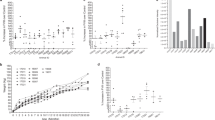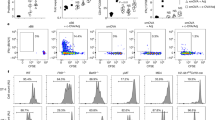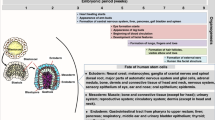Abstract
THE ability of α-fetoprotein (AFP) of mouse or human origin to suppress certain T cell-dependent immune reactions in vitro is well documented1–4. These findings on a tumour-associated embryonic substance5 have potentially important implications as to our understanding of the maternal–foetal immunological relationship6, the development of immune capabilities in the foetus and newborn7, and of certain diseases8 where immunological hyporeactivity and elevations in AFP often occur concomitantly. The mechanism(s) through which AFP is exerting its immunoregulatory influence is largely unknown, however, previous studies1 have shown that AFP must be added at the initiation of antigen-stimulated spleen cell cultures for maximal inhibition of primary antibody synthesis to occur. Continued presence of AFP in the cultures for 8–12 h was sufficient to maintain suppression in an AFP-free environment for at least 5 d in vitro1 and 10 d in vivo using adoptive transfer experiments (unpublished). These observations suggested that AFP may inhibit immune responses indirectly by activating regulatory suppressor cells. Here we report that AFP does indeed induce the formation of highly efficient suppressor T cells with capacity to inhibit helper T cells, but with no effect on B cells responding to thymus independent antigens.
This is a preview of subscription content, access via your institution
Access options
Subscribe to this journal
Receive 51 print issues and online access
$199.00 per year
only $3.90 per issue
Buy this article
- Purchase on Springer Link
- Instant access to full article PDF
Prices may be subject to local taxes which are calculated during checkout
Similar content being viewed by others
References
Murgita, R. A. & Tomasi, T. B. J. exp. Med. 141, 269–286 (1975).
Murgita, R. A. & Wigzell, H. Scand. J. Immun. 51, 215–1220 (1976).
Zimmerman, E. F., Voorting-Hawking, M. & Michael, J. G. Nature 265, 354–356 (1977).
Lester, E. P., Miller, J. B. & Yachnin, S. Proc. natn. Acad. Sci. U.S.A. 73, 4645–4648 (1976).
Abelev, G. I. Transplant. Rev. 20, 3–37 (1974).
Murgita, R. A. Scand. J. Immun. 5, 1003–1014 (1976).
Spear, P. G. & Edelman, G. M. J. exp. Med. 139, 249–263 (1974).
Adinolfi, A., Adinolfi, M. & Lessof, M. H. J. med. Genet. 12, 138–151 (1975).
Marbrook, J. Lancet ii, 1279–1281 (1967).
Wigzell, H. Scand. J. Immun. 5, 23–30 (1976).
Mosier, D. E., Johnson, B. M., Paul, W. E. ≈ McMaster, P. R. B. J. exp. Med. 139, 1354–1360 (1974).
Mosier, D. E. & Johnson, B. M. J. exp. Med. 141, 216–226 (1975).
Goidl, E. A., Klass, J. & Siskind, G. W. J. exp. Med. 143, 1503–1520 (1976).
Olding, L. B. & Oldstone, M. B. A. J. Immun. 116, 682–686 (1976).
Author information
Authors and Affiliations
Rights and permissions
About this article
Cite this article
MURGITA, R., GOIDL, E., KONTIAINEN, S. et al. α-Fetoprotein induces suppressor T cells in vitro. Nature 267, 257–259 (1977). https://doi.org/10.1038/267257a0
Received:
Accepted:
Issue Date:
DOI: https://doi.org/10.1038/267257a0
This article is cited by
-
AFP promotes HCC progression by suppressing the HuR-mediated Fas/FADD apoptotic pathway
Cell Death & Disease (2020)
-
Surgical management of a large hepatocellular carcinoma in an octogenarian patient
Hellenic Journal of Surgery (2011)
-
Long-term Outcomes and Prognostic Factors of Elderly Patients with Hepatocellular Carcinoma Undergoing Hepatectomy
Journal of Gastrointestinal Surgery (2009)
-
Resection of Peritoneal Implantation of Hepatocellular Carcinoma after Hepatic Resection: Risk Factors and Prognostic Analysis
World Journal of Surgery (2004)
-
Growth inhibition of human liver cancer cells by alpha-fetoprotein antisense strategy
In Vitro Cellular & Developmental Biology - Animal (1999)
Comments
By submitting a comment you agree to abide by our Terms and Community Guidelines. If you find something abusive or that does not comply with our terms or guidelines please flag it as inappropriate.



